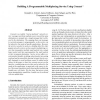Free Online Productivity Tools
i2Speak
i2Symbol
i2OCR
iTex2Img
iWeb2Print
iWeb2Shot
i2Type
iPdf2Split
iPdf2Merge
i2Bopomofo
i2Arabic
i2Style
i2Image
i2PDF
iLatex2Rtf
Sci2ools
113
click to vote
ICNP
2000
IEEE
2000
IEEE
Building a Programmable Multiplexing Service Using Concast
Concast is a scalable “inverse-multicast” network service: messages sent from multiple sources toward the same destination are merged into a single message that is delivered to the destination. The mapping from sent messages to received messages is programmable, so the service can be tailored to the needs of specific applications. However, the service can also be used as a building block for other generic network services, such as a packet multiplexing service that encapsulates multiple small packets into a single larger packet and then unencapsulates the small packets at their (common) destination. Such a service offers several potential benefits, including reduced packet processing overhead and increased fate-sharing, but must also be carefully designed to avoid problems caused by added packet delays. In this paper we show how concast can serve as the basis for a multiplexing service that can be tailored to the needs of the application, in particular with respect to delay. We ...
Computer Networks | ICNP 2000 | Multiplexing Service | Network Services | Packet Multiplexing Service |
Related Content
| Added | 31 Jul 2010 |
| Updated | 31 Jul 2010 |
| Type | Conference |
| Year | 2000 |
| Where | ICNP |
| Authors | Kenneth L. Calvert, Jim Griffioen, Amit Sehgal, Su Wen |
Comments (0)

